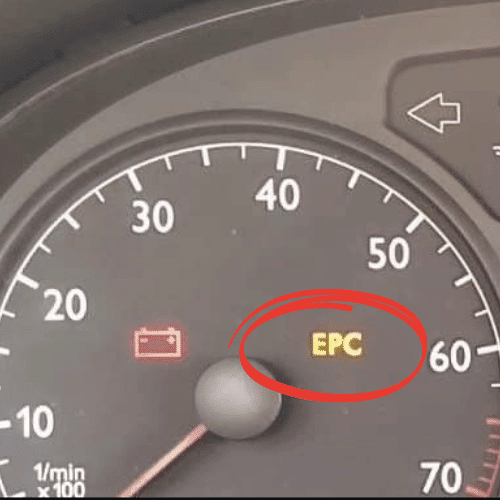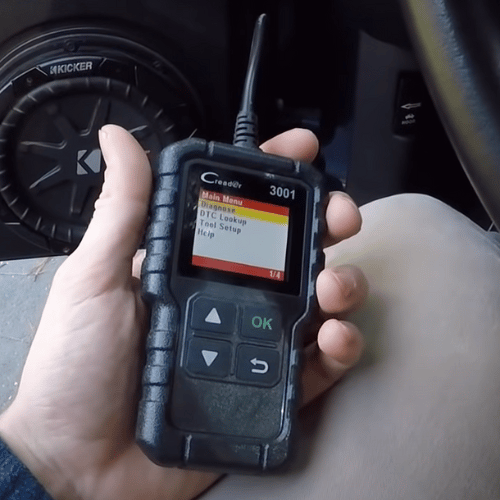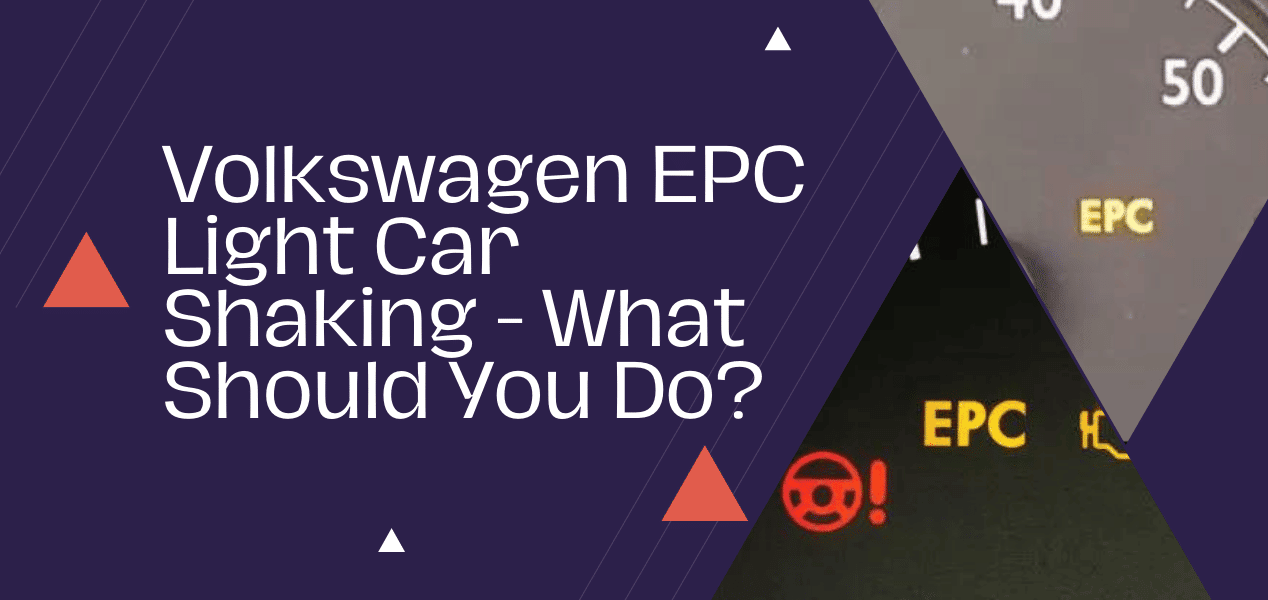You may have carefully chosen a Volkswagen vehicle as your car because of its undeniable style and flair. Apart from the eye-catching sleek design, Volkswagen cars are known for their performance, low price tag, and reliability.
However, you might find that the EPC warning light turns on and feel the car started shaking. The problem of Volkswagen EPC light car shaking may be caused by a rough brake surface, faulty ignition coil, unbalanced tires, faulty fuel injector, or an engine mount.
Although it will seem alarming, we have diagnosed this problem and have listed the ways to fix the EPC light and shaking issue. So let’s go right ahead!
- What Does The VW EPC Light Mean?
- Why Is My VW Shaking?
- How Do I Fix The EPC Warning Light?
- How Do I Fix The Volkswagen Vehicle Shaking?
- 1. Problem cause: Rough surface on the brake pad
- 2. Problem cause: A faulty ignition coil
- 3. Problem cause: Poor wheel alignment leading to unbalanced tires
- 4. Problem cause: A faulty fuel injector
- 5. Problem cause: Possibly damaged engine mount
- 6. Problem cause: Out of balance driveshaft
- 7. Problem cause: Vacuum leak
- Conclusion
What Does The VW EPC Light Mean?

First and foremost, you should be aware of what the EPC light actually indicates. The full form of EPC is Electronic Power Control and is only seen in Volkswagen groups, Bentley, and Audi vehicles. This basically keeps all the electronic power units in check and will light up when certain issues arise.
When this particular signal lights up, it usually means there is something wrong with the traction control, throttle body, and cruise control.
Why Is My VW Shaking?
Your Volkswagen’s EPC light might not always be alarming, but you shouldn’t ignore it either. However, when you feel your car shaking along with it, that could point to some critical issues.
The most common causes of car shaking are a faulty ignition coil, malfunctioning brake light switch, faulty accelerator and throttle system, air pressure issues, a bad spark plug, and even damaged motor mounts.
As Volkswagen cars are best known for their efficiency, any of the mentioned problems will hamper the performance on the road.

How Do I Fix The EPC Warning Light?
There are multiple reasons why your VW EPC light is on. But to be able to fix the problem, you need to diagnose it first. These are what you can do:
1. Run an OBD scan

If you are well versed in car mechanisms, then you are probably aware of what an OBD scanner does. All you have to do is plug the OBD1 & 2 scanners in your car and read what the scan says about the EPC light.
The results will display some error codes relating to the EPC system controls. Go to the menu on the device and read the trouble codes accordingly.
2. Check for physical damage
If your car is damaged badly on the exterior, it could also cause the VW EPC light to go on. Some essential checks you can do are making sure the rear light and brake light is okay. A common reason for the EPC system warning going off is because of issues with the car lights.
3. Investigate throttle body
Carbon deposits in the throttle body are a common thing that most of us forget to check from time to time. These can get accumulated and create a thick film which can eventually damage some parts of the throttle system.
You can simply get a throttle body cleaner to remove all that debris and carbon build-up. Be sure that everything is connected properly within the throttle system, and hopefully, there will be no more issues.
4. Look for other damaged parts
If you find other problems, it is best to check if any of your vehicle parts are damaged and repair or replace them as soon as possible. It is also essential to ensure that the engine is working properly.
One final step to complete is to do a VW EPC light reset using the OBD scanner. After all that is done, your vehicle’s EPC warning light should no longer be on.
How Do I Fix The Volkswagen Vehicle Shaking?
Now that you know how to fix your VW EPC light issue, it’s time to see how you can fix the car shaking issue. We have elaborated on some of the most common causes and provided their respective possible fixes.
1. Problem cause: Rough surface on the brake pad
The most common cause of an uneven backside (rear) of the brake pad is friction. Other reasons can be the excess buildup of carbon and low lubrication. One way to know for sure that your car shaking issue is caused by the brake system is when you feel it shake when applying the brakes.
Solution:
Check the brake rotors to see that they fit with your vehicle’s configuration. Non-matching rotors placed in the brake system can be dangerous for the brakes. The best thing to do would be just to replace the brake pad with a brand new one, so you don’t have to worry about unnecessary friction.
2. Problem cause: A faulty ignition coil
This is one of the more serious issues you should look out for. If you find your car shaking while it is idling or when you drive slowly, this indicates that the ignition coil is defective.
When such an issue is prolonged without any fixes, it can cause engine damage. Basically, when there are a faulty ignition coil, the engine misfires and stumbles, causing the car to shake. Power loss is caused, resulting in your car not accelerating properly.
Once again, you can use the OBD scanner to find out which of the cylinders in the coil packs are causing the problem. You should also check the spark plugs and see if they are malfunctioning.
Solution:
The fix for this is quite simple and straightforward. All you need to do is replace that faulty ignition coil with a competitive replacement. Hopefully, your shaking Volkswagen car will come back in better shape and performance.
3. Problem cause: Poor wheel alignment leading to unbalanced tires
After a particular period of usage, VW tires will become misaligned and uneven. Naturally, they won’t be hitting the road in a uniform manner, and you will notice your Volkswagen vehicle shaking.
You can spot unbalanced tires when the air pressure distribution is not smooth and also when the tires are just not level with each other.
Solution:
Go to your closest car mechanic and have the air pressure evened out professionally. You could also get a whole new set of tires for your VW. The car shaking will be significantly reduced.
4. Problem cause: A faulty fuel injector
Just like how ignition coils work to combust the engine, the role of a fuel injector is similar, as it sprays fuel to start the engine. When there is excessive or very little fuel spraying into the engine, it will cause misfiring and the car to shake.
Solution:
Scan your car and see what error codes are related to a faulty fuel injector. You can then have the injectors cleaned or replaced as needed.
5. Problem cause: Possibly damaged engine mount
The engine mount is what basically holds your vehicle’s engine in place. In short, it acts as the foundation and support structure for the engine and associated components. Although this structure is built to last for extended periods, it can significantly wear over time and reduce the engine’s power and efficiency.
When your Volkswagen engine isn’t sitting properly in place, there will be increased movement when driving. And, you’ve guessed it – car shaking.
Solution:
The solution for this issue is straightforward but rather expensive. However, it is the only way to go. You will have to repair or replace the engine mount so that it is fully functional.
6. Problem cause: Out of balance driveshaft
The main reason for a driveshaft to be unbalanced or damaged is when it is somehow physically broken or bent out of shape. For a VW car, this can be critical, and it is best to get it fixed as soon as possible.
Solution:
Take your VW to a mechanic and get the driveshaft replaced. It is best to find someone who works specifically with VW cars, as the configurations may be slightly different.
7. Problem cause: Vacuum leak
This fault is also directly linked to engine misfiring. If there is a leak in a particular cylinder, the fuel won’t reach the engine and will cause it to idle. Extra air enters through the leak and hampers the fuel-to-air ratio, also causing uneven levels in air pressure.
If you have noticed vibrations in the steering wheel or gas pedal when idling your VW car, then you can be assured that a vacuum leak is an issue. Not only will your car shake, but it will cause internal overheating and a damaged engine.
Solution:
You can simply apply a patch to the seal of the leak, or you can get a new seal altogether.
Conclusion
We don’t just want our Volkswagen cars to look good on the road, but to perform well too. The task undoubtedly becomes difficult if the EPC light turns on or if you feel the car shaking.
Some of the issues might seem simple, but it is still never a good idea to continue driving your VW with the EPC light on, especially not when it is shaking erratically. With a couple of observations and tools, you can find out the root of the problem and get on with fixing them as soon as you can.

